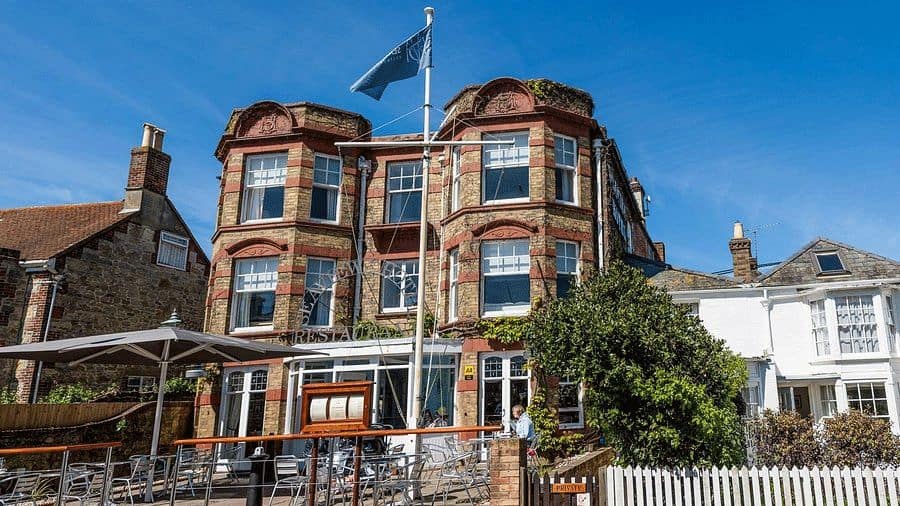
Smartening up hot water in Isle of Wight hotels
Wight Community Energy (WCE) is a community benefit society at the heart of developing a sustainable, low carbon, economically prosperous Isle of Wight.
With recent funding from Power to Change and the Rural Community Energy Fund, WCE are undertaking a number of new projects to deliver community-owned renewable energy and improve energy efficiency on the Isle of Wight. One of these projects focused on lowering the energy consumption of hot water systems by the hotel and B&B community, using our smart hot water controls, and increasing consumption of locally generated low carbon electricity through the Isle’s distributed hot water cylinders.
In the first phase of the project in 2021, we installed monitoring equipment onto existing hot water tanks in four typical Island hotels. The data collected was then used to identify the characteristics of the existing systems and model the improvements that would come from using our pioneering tanks.
Tracking hot water consumption over a range of peak and off-peak periods would enable us to answer the following questions:
- Are current hot water systems suitably sized?
- Is there enough variability in water demand to warrant a smart ‘top-up’ style water heater in hotels and B&Bs on the Isle of Wight?
- Is the morning consumption profile of a property suitable for topping up throughout the day using locally generated low-carbon electricity?
- What recommendations can be made at a local and Isle scale?
This project is a great opportunity for the Island. The machine-learning capabilities of the Mixergy tanks will reduce energy consumption in the hospitality sector, helping the selected hotels to reduce their energy use and still provide an excellent experience for their visitors. Longer term, WCE will support and promote the wider scale adoption of these smart hot water tanks to spread their energy saving benefits. There is also the potential to build an internet-connected smart electrical network of these tanks to expand the demand for renewable energy capacity on the Island, a vital contribution to achieving the Island’s net zero ambitions.
Colin Palmer Director of Wight Community Energy
Mixergy’s technology means that we have a unique ability to measure and track hot water profiles accurately and remotely, providing a novel opportunity to measure the hot water activity of a range of properties. These insights allowed us to assist IoW Community Energy in achieving its project aims of understanding the seasonal variation in hot water production and the opportunities that exist for lowering energy and carbon.
We deployed an externally mounted data logger and controller that used an array of temperature probes that were externally mounted to fit into the cylinder’s insulation and allow a reading of the hot water cylinder’s full temperature profile. The data loggers were fitted to the outside of each cylinder, powered by local 240v power supplies, and connected to local internet connections using an Ethernet over Powerline adapter. The data loggers allowed us to track:
- Hot water level
- Heating times
- Hot water demand and use
- Stored water temperatures
- Insulation efficiency
These installations were undertaken in May 2021 and monitored until October 2021 to cover a range of occupancy levels i.e., peak summer season vs. off-peak autumn utilisation.
Installations were carried out in the Seaview Hotel, St Maur Hotel, The Chestnuts Guest House, and Westbury Lodge Hotel.
Seaview Hotel
At the Seaview Hotel, the hot water tanks are within a dedicated plant room on the ground floor of an annexe building and are installed in parallel; providing hot water to rooms concurrently.
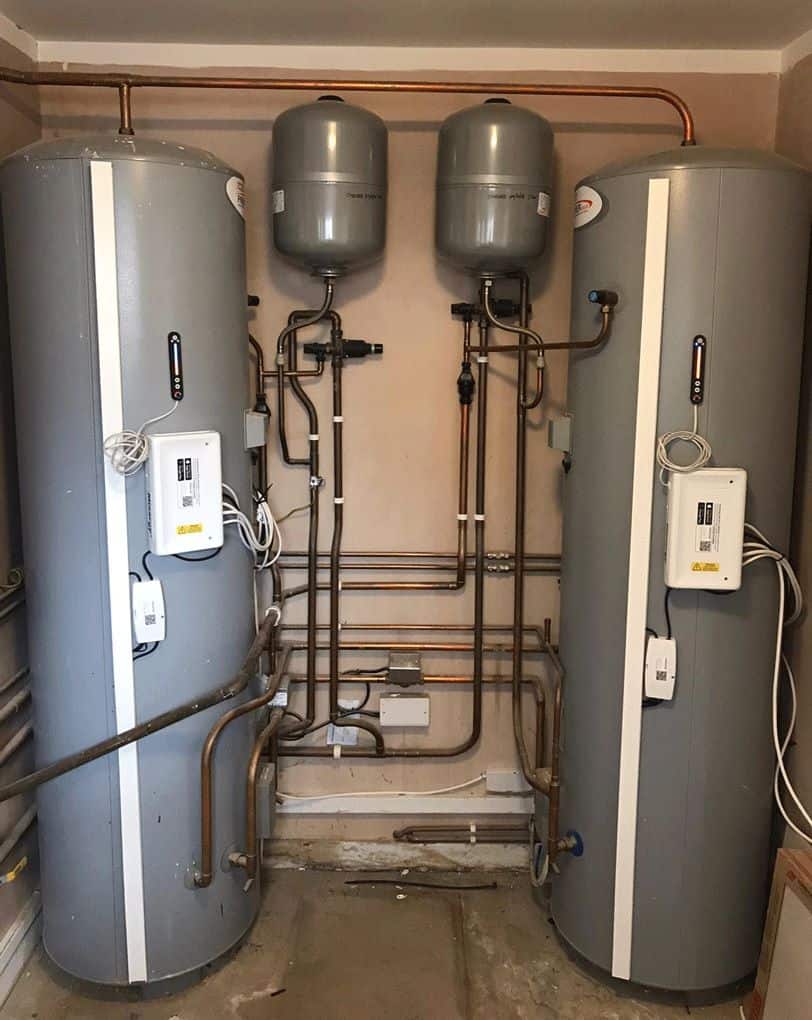
From the trial, we identified there was an opportunity to lower energy consumption by only using their second hot water cylinder during the most intense peak occupancy periods and operating the single water heater for the majority of the year. This would then half the water spent for large periods of the year.
Theoretically, the pair of cylinders operating as primary and secondary water heaters could both be used as thermal batteries and topped up during the day using locally generated low carbon solar energy. The lack of water consumption during the day means that a slower solar PV recharge would be acceptable without negatively impacting the occupant experience.
St Maur Hotel
The St Maur Hotel was using a conventional copper vented hot water tank. The data insights gathered were considerably different from those recorded at Seaview Hotel. This tank was a traditional spray foam insulated copper vented cylinder, which is much less efficient than the stainless-steel version used at Seaview. We noted that the tank was undersized for peak demand. A Mixergy ‘heat what you need’ tank however would allow a smaller volume to be heated in the morning, topped up during the day, and a larger volume heated in the evening.
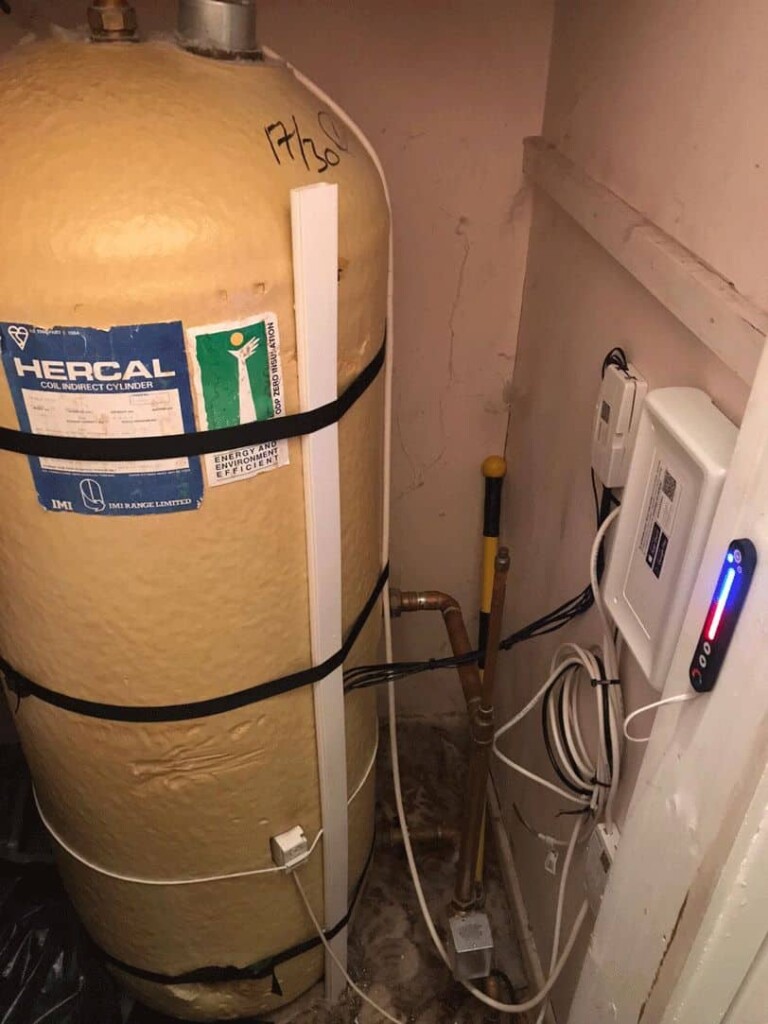
The Chestnuts Guest House
The Chestnuts used a modern 300L Heatrae Sadia stainless steel unvented hot water tank, with a high level of insulation. The tank was kept topped up on all days with a constant heating profile but lack of optimised controls. We identified that the largest tank draw was just 40%, therefore the tank could be better set to use timer control to lower the energy being used to heat the full volume each day. But there was definitely enough variability in demand to benefit from the Mixergy ‘heat what you need’. This would also allow headroom for solar-generated electricity to be dumped into the tank during the summer if made available. Because the cylinder is always ‘full’ (due to continuous heating) there is currently no capacity within the tank for storing excess solar-generated electricity.
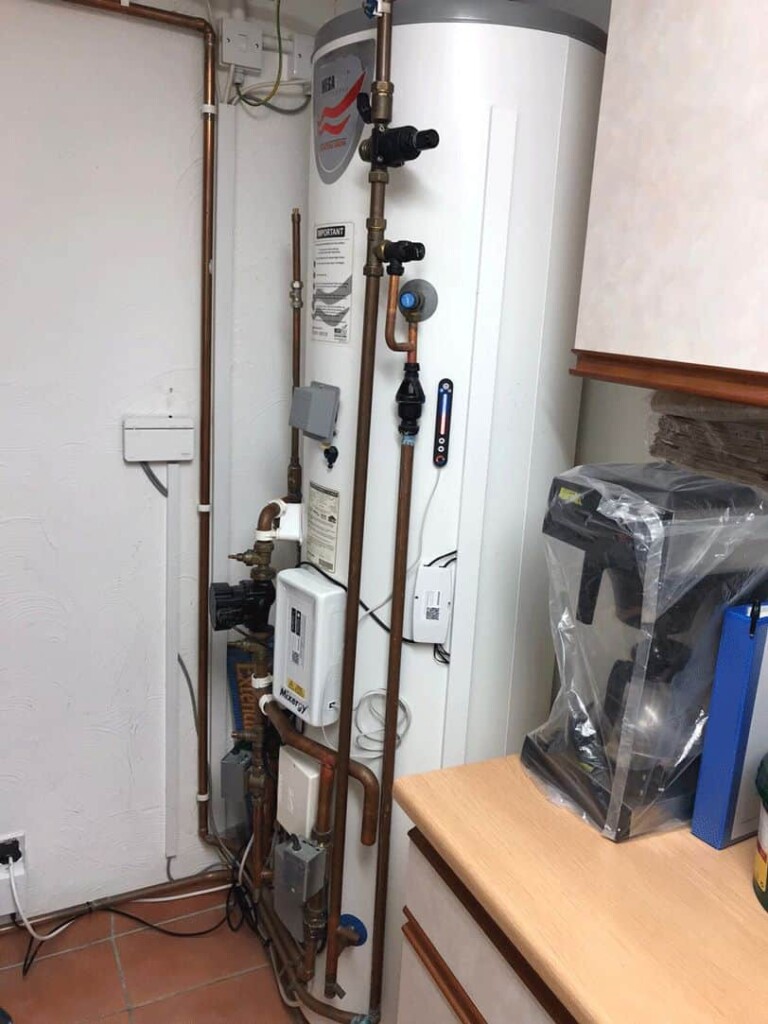
Westbury Lodge Hotel
Westbury used a single old-style copper vented spray foam insulated hot water tank, and this was the oldest and most inefficient tank used in our trial. With poor insulation, the high level of heat loss means the tank was often reheating 4x per day, even with no hot water demand. We calculated that this cylinder lost 4-5kWh per day, which is 3x higher than the other cylinders logged. This equates to an annual standing energy loss of £65 per annum (based on £0.04/kWh for gas) alone. A replacement to a more modern tank with insulation would half the costs for hot water.
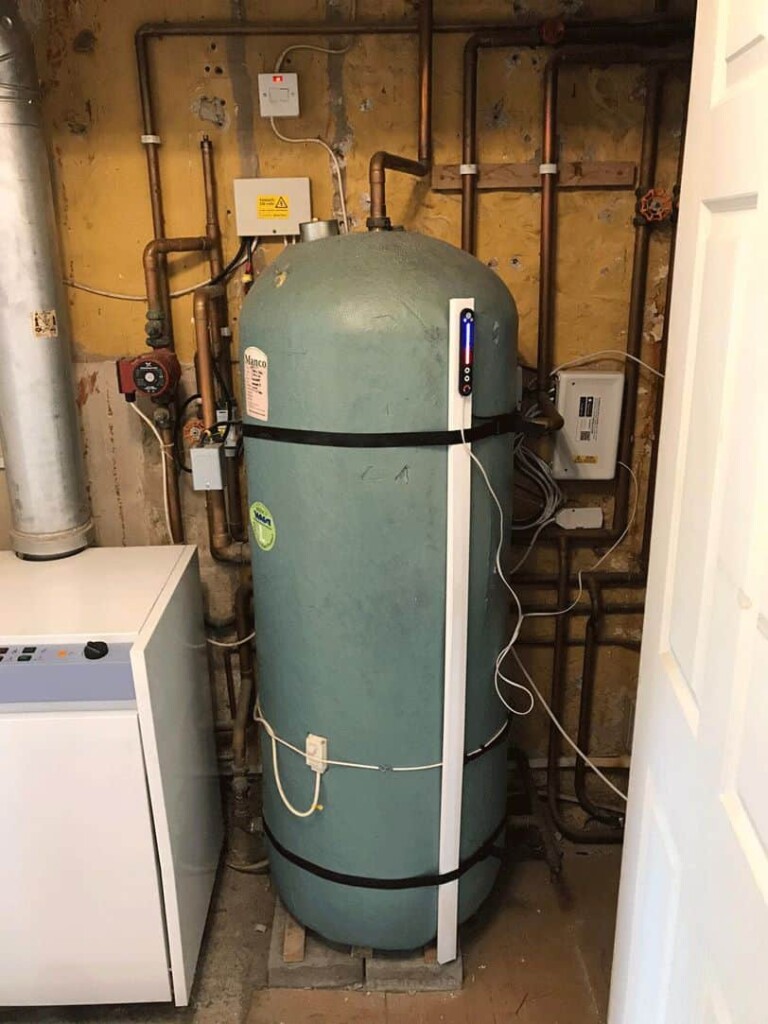
This project has highlighted a number of valuable insights:
- Each hotel has a different profile of demand throughout peak season and off-peak season, however, there is a blanket heating approach applied to all sites, in which as much water is heated for as long as possible. This means that the schedules do not reflect demand, leading to high energy use when it is not required.
- With the exception of Westbury Lodge, which is too inefficient, the opportunity for savings delivered through timer controls exists for all properties. Timer controls would allow scheduled heating events to heat volumes for the most demanding periods of the day (morning and evening) rather than constantly heating the water just in case, which was the case in all sites logged.
- Each site would benefit from a seasonally adjusted schedule, in which water is heated more frequently when the hotel has higher levels of occupancy.
- Those sites with modern cylinders (Seaview & Chestnuts) would be the easiest sites to start with heating controls as the systems require no other modifications or adjustments.
- Those sites with the copper vented spray foam insulated cylinders (St.Maur and Westbury Lodge) require replacement before any investment in heating controls and we would recommend replacing the current system with a more efficient stainless steel cylinder.
- All sites would benefit from having their hot water pipework insulated to prevent energy from being wasted unnecessarily heating the plant rooms.
- All sites with stored water could be used for dynamic renewable load storage i.e. peak summer solar heating via immersion but would require a smart cylinder to enable this function, such as the Mixergy cylinder. There is clear evidence of low hot water demand during peak season days, supporting the hypothesis that solar energy could be utilised by powering cylinder-mounted immersions. This would require a central tariff or signal mechanism to be made available. The Mixergy tanks can power immersions at given times if the solar load is high, but a coordinated approach to facilitating this through connected water tanks would be required.
- There is enough capacity within these small ‘domestic size’ hot water cylinders to absorb a considerable amount of solar power during the day. A domestic hot water tank can absorb 8-14kWh of energy per day (depending on size), based on cold water being heated 40˚C. If enough hot water tanks on the Isle were made available for energising immersions during peak hours of summer, more locally generated solar energy could be utilised. Installing a few Mixergy tanks on the Isle with the top-up ‘heat what you need’ technology would allow us to demonstrate this in practice on the Isle without the need for an integrated solar>grid>tariff>tank infrastructure. This local solar and immersion optimisation project is a potential trial target for Phase 3.
- With the Mixergy data logger and a Mixergy tank, the smart sensor strip that runs the length of the tank can track the entire tank’s temperature conditions. This makes it possible to report and audit water cleanliness i.e. pasteurisation and cleansing activity. It would be interesting to understand what measures are currently taken by the hotels and if these data points are of value; if this information is of value, it can be presented in a more meaningful way to support compliance activity.
Funding has now been secured from Power to Change to enable up to three of our award-winning hot water tanks to be installed at selected hotels at no cost to the owners, to showcase the savings that can be made over the holiday season. Our smart hot water tanks can save energy, reduce the chances of running out of hot water and, when many of them are linked via the internet, strengthen the weak electrical network on the Island.
If you would like to discuss how Mixergy can help to lower bills across your hospitality site, please contact us to find out more.

